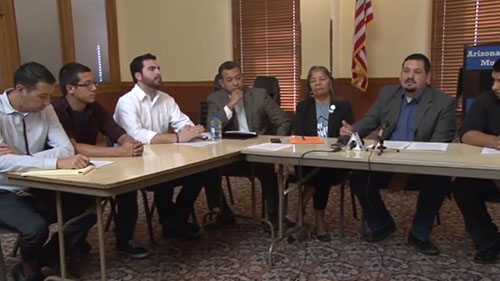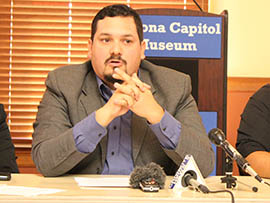Cronkite News has moved to a new home at cronkitenews.azpbs.org. Use this site to search archives from 2011 to May 2015. You can search the new site for current stories.
Report: Latino voting power continues to increase in Arizona
PHOENIX – Latino voters in Arizona are steadily increasing their impact on elections, according to a report released Thursday by the voter-registration group One Arizona.
“What we want to highlight is the growing portion of electors,” said Francisco Heredia, One Arizona’s executive director. “It will continue to grow steadily into being a political force.”
According to State of Arizona’s Latino Voters: Election 2014 Report, the number of registered Latino voters who have signed up for early voting list has tripled since 2010. The share of votes cast by Latino voters rose from 9 percent in 2006 to 12 percent in 2010. One Arizona estimates that that number will go above 14 percent this year.
Figures from U.S. Census Bureau and the Pew Hispanic Research suggest that with more than 65,000 Latinos in the United States turning 18 every month Arizona’s Latino population is expected to double in the next 20 years and to become a majority by 2035.
Heredia said the larger share of Latino votes will mean more of a political voice.
“Politicians now can’t take the Latino community for granted,” he said. “They will have to invest the next elections and talk to Latinos about wining their votes.”
Eric Christopher Hedberg, senior research scientist with Arizona State University’s National Opinion Research Center, said the increasing share the vote cast by Arizona’s Latinos reflects the aging of that population.
“Unlike the white population, the Hispanic population is bottom-heavy,” he said. “It’s not a bunch of old people but a bunch of young people.”
Bill Hart, policy analyst with ASU’s Morrison Institute for Public Policy, said Latinos will dominate Arizona’s politics in a few decades if their level of participation keeps increasing. That will influence issues such as immigration, health care, employment and, most significantly, education, since many schoolchildren will be Latino, he said.
“As Latinos achieve greater and greater levels of political power, they will use some of that influence to try to improve the state’s public education system,” Hart said.









